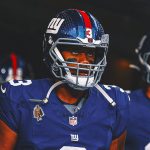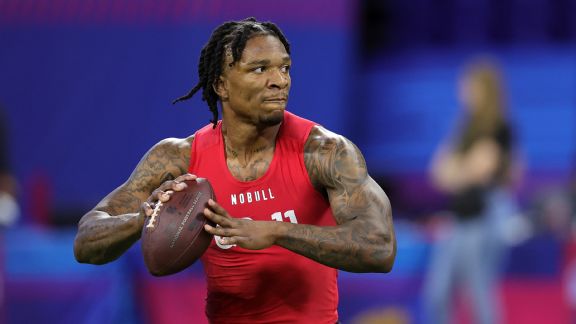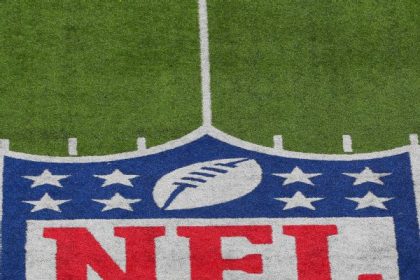
INDIANAPOLIS — The NFL draft is fast approaching, meaning there’s been a flurry of news about which teams are interested in the top quarterbacks.
C.J. Stroud of Ohio State, Bryce Young of Alabama, Anthony Richardson of Florida and Will Levis of Kentucky are racking up the frequent-flier miles, visiting many of the teams selecting in the top 10 on April 27 (8 p.m. ET on ESPN, ABC, ESPN App).
Meanwhile, there’s been virtual silence on the Lamar Jackson front, including from the Indianapolis Colts.
The Baltimore Ravens’ quarterback, who was given the nonexclusive franchise tag in March, has had no known advanced negotiations with any other team. Jackson, who does not have an agent and is representing himself, is eligible to sign an offer sheet with any club, and the Ravens would have five days to match or receive two first-round picks as compensation. Jackson’s contract talks with the Ravens have stalled after more than two years of negotiations. And he revealed recently that he asked for a trade.
No team outside Baltimore has been more willing to publicly embrace the idea of potentially adding Jackson than Indianapolis, with general manager Chris Ballard recently acknowledging the team’s interest by saying, in part, “Anytime a special player is available, which he is, you’ve got to do the work.”
That’s a very different position than other teams that have deflected or denied any interest in pursuing Jackson. Couple that with Indianapolis’ glaring need at quarterback and it seemed plausible that Jackson and the Colts might be able to find some common ground. There were, according to team sources, earnest internal conversations about Jackson at Colts headquarters.
Still, here’s what we know about the team’s current quarterback plans: If Indianapolis is going to make a move with Jackson, it would have to come before the draft, because the Colts appear to be steadily moving forward with their intent to select a quarterback with their fourth overall pick.
The Colts took a contingent of staffers on a coast-to-coast jaunt over the past two weeks, conducting workouts with the four aforementioned quarterbacks. Meanwhile, there is no indication they’ve engaged in serious talks with Jackson.
There are several factors that have most influenced the Colts’ actions. Here are a few, along with a broader view of Indianapolis’ draft prospects.
Economics: The allure of adding a talent like Jackson, the 2019 NFL MVP, is obvious. But so are the economic challenges of doing so. The price tag of signing Jackson cannot be viewed in a vacuum for the Colts. Instead, it is viewed by the team in contrast to the cost of the quarterback Indianapolis will likely draft, according to a league source.
The fourth overall pick in this year’s draft will earn a four-year contract worth around $36 million in total value. That is less than it would cost for a single season on any long-term contract Jackson would agree to.
Just use Deshaun Watson’s five-year, $230 million contract with the Cleveland Browns as a point of comparison. At an average of $46 million per season, that’s $184 million over four years. Over a four-year period, the Colts will theoretically pay a 2023 draft pick $148 million less.
Stance on draft picks: Signing a franchise player to an offer sheet means a team is willing to part with two first-round picks. Colts owner Jim Irsay has made it clear he gives significant weight to the value of those picks, which he said “are like gold.”
“Our belief, and my belief, has always been you build through the draft, the draft is your pipeline for success or failure,” Irsay said. “That is where it’s at.”
That might seem somewhat inconsistent for a team that traded a first-round pick and third-round pick to the Philadelphia Eagles for Carson Wentz in 2021, right on the heels of the quarterback’s ugly 2020 season. But that trade actually helped reinforce Irsay’s current position on draft picks, given how it turned out (Wentz was traded after one season).
Another point: The first-round pick that Indianapolis sent to Philadelphia was No. 16 overall. In terms of value, that’s very different than the Colts’ current slot at No. 4 overall.
Free agent philosophy: Anyone who has followed the Colts closely in recent years should be familiar with their stance on free agency. The Colts generally use free agency to fill second-tier needs, not those at their most important positions.
The list of prominent free agents signed by the Colts in recent years is quite short. There’s quarterback Philip Rivers in 2020, but that was a one-year deal that was never intended to be long-term. Defensive end Justin Houston signed a two-year, $24 million contract with Indianapolis in 2019, but that was hardly a top-of-market deal for his position.
Considering this tendency, it was never really a given that the Colts would target a free agent to be their franchise quarterback. History will determine whether it proves to be the right decision, but there is a well-established habit under Ballard when it comes to free agency.
Which QB? There are indications, according to a team source, that there is no consensus among team officials on which quarterback the team prefers. Internally, the Colts are preparing for the possibility that Stroud and Young will be selected with the first and second picks, respectively. If Indianapolis is faced with a decision between Richardson and Levis, that’s where it gets interesting.
The Colts’ interest in both players has long been established. But here’s a tidbit that speaks to their level of intrigue in Richardson: The Colts’ private workout with Richardson at the University of Florida last week wasn’t the first time the team dispatched members of the front office to evaluate him. The Colts also sent a group of staffers to Jacksonville, where Richardson has done his pre-draft training, in early February — even before the NFL scouting combine, according to a team source.
And it’s possible Carolina’s interest in Richardson as the top pick is being underestimated.
Tradewinds: ESPN’s Adam Schefter reported this week that the Arizona Cardinals are mulling interest from multiple teams with an eye on their No. 3 overall pick. With the Colts’ intentions of picking a quarterback already widely known, teams might be enticed to jump ahead of Indianapolis, adding an intriguing subplot early in the draft.
Ballard hasn’t ruled out a trade up and will likely feel pressure to do so because there will be other motivated teams.
There are a few teams, in particular, to watch. The Seattle Seahawks (No. 5) have two first-round picks and have long-term flexibility in the contract recently signed by quarterback Geno Smith. The Atlanta Falcons (No. 8) are among the teams that have been doing due diligence on quarterbacks. And the Tennessee Titans (No. 11) are considering their options, led by first-year GM Ran Carthon. Keep in mind, Carthon was hired from San Francisco, where the 49ers have earned a reputation for being very aggressive in the trade market.
Finally, if and when the Colts trade up, it might say something about their conviction in the quarterback they ultimately select. Trading up one spot — which will still come at a cost — is very different than standing pat and taking whichever player falls to you.












